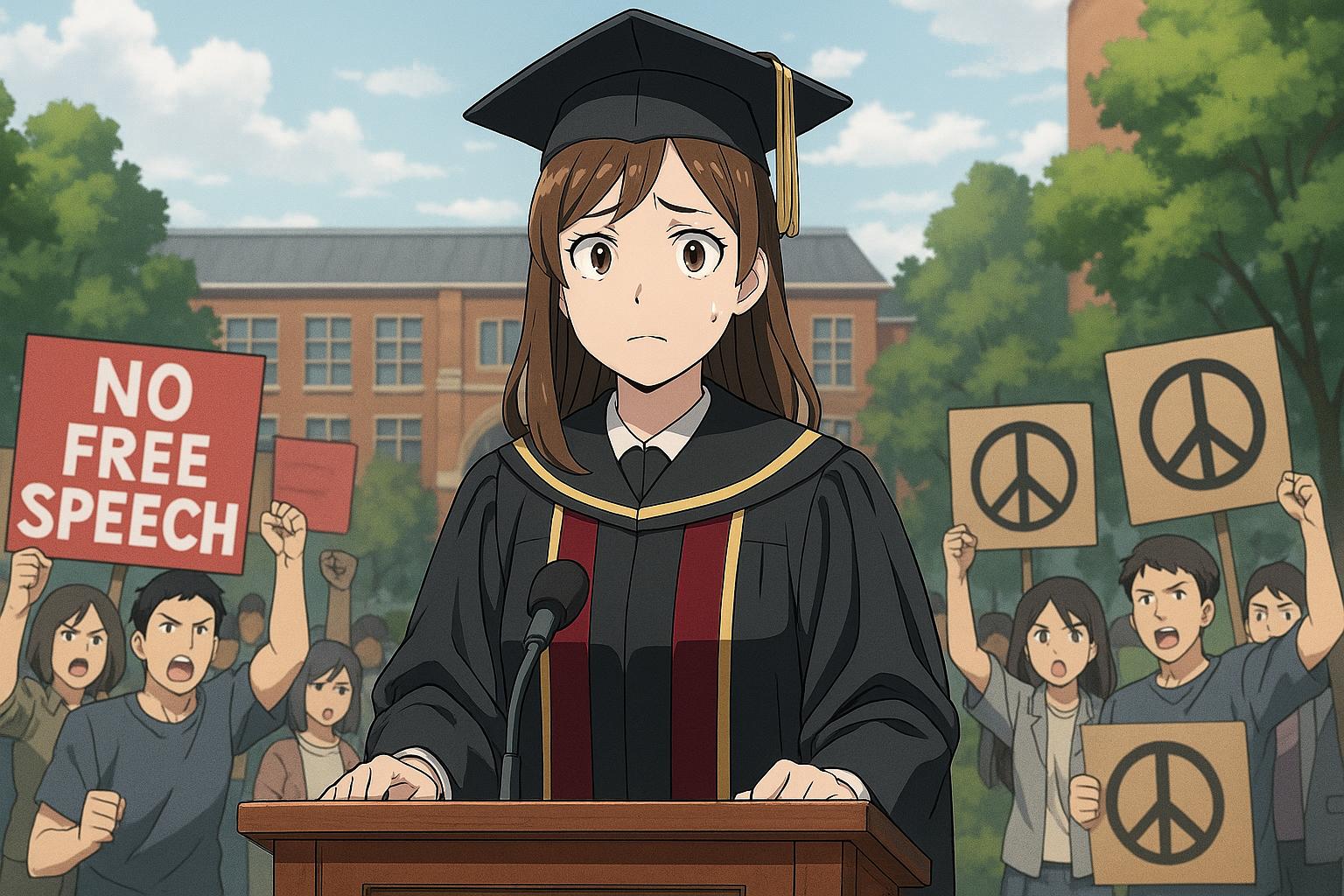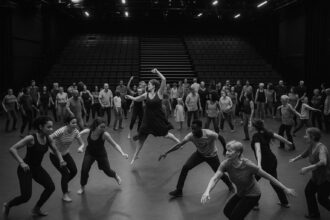The dispute over rector Stella Maris’s comments on the Israel-Hamas conflict has exposed deep tensions around free speech, institutional bias, and student safety at the University of St Andrews, prompting an independent inquiry and sparking widespread debate.
The ongoing turmoil at the University of St Andrews regarding comments made by rector Stella Maris sheds light on the complex interplay between free speech, institutional governance, and the delicate subject of geopolitical conflict. Following the violent Hamas attacks on Israel on October 7, 2023, reactions across university campuses culminated in intense debates over allegations of antisemitism, protests, and subsequent safety concerns for Jewish students.
At the heart of this crisis is Alastair Merrill, governance chief and vice principal, whose involvement has emerged as pivotal. Emails obtained via Freedom of Information legislation indicate his significant role in influencing the language and scope of an independent investigation into Maris’ communications. He advised against even neutral references to the ongoing conflict in her initial messages to students—an approach that eventually shifted dramatically after Maris’s later assertions.
On November 21, 2023, after initially subscribing to Merrill’s guidance, Maris sent an email that accused Israeli forces of conducting “genocidal attacks” in Gaza, while also condemning Hamas for the October 7 assault that claimed over 1,000 Israeli lives. This communication ignited an immediate backlash from Jewish students, who expressed feelings of being “unsafe” and “fearful” in light of the rhetoric used.
As tensions escalated, the university sought the expertise of Lady Morag Ross KC to lead an independent inquiry into Maris’s conduct. However, emails from Merrill suggest he sought to shape both the wording and direction of the probe itself, raising serious questions about the integrity of the investigation. For instance, during discussions on the terms of the inquiry, Merrill expressed concern over the language used, asserting the need to ensure it remained narrowly focused, which he implied would protect the image of the university.
The fallout continued when the independent investigation determined that Maris had breached her obligations as a court member. While the specifics of her comments on social media were deemed “ill-judged,” the judgment also highlighted her failure to act with the expected “courtesy and respect.” This decision ultimately led to her removal from key responsibilities within the university’s governance structure, although she retained her title as rector until her official term concludes in October 2026.
Controversies surrounding freedom of speech were further amplified by the resulting claims of a smear campaign against Maris. She subsequently appealed her dismissal, with a ruling from university chancellor Menzies Campbell reversing the earlier decision, thereby allowing her to resume her role and reigniting debates about free expression within academic institutions.
The repercussions of this controversy extend beyond university governance; for instance, a major charity closely linked to Israel nearly withdrew a substantial £2 million donation amid these disputes. Lawmakers, including Mid Scotland and Fife Green MSP Mark Ruskell, have called for the university to reconsider its handling of the investigation, claiming that communications between Merrill and Ross suggested an inherent bias against Maris.
As the university navigates these challenging waters, it faces the critical task of reconciling open discourse with the need for a supportive environment for all students. The emerging narrative is not only about the actions of individuals but also about how educational institutions manage sensitive socio-political issues and their broader implications for community trust and campus safety.
Against this backdrop, the situation at St Andrews exemplifies the far-reaching consequences that can arise when institutional governance intersects with contentious global issues, compelling universities to carefully balance freedom of expression against their commitments to inclusion and safety.
Reference Map
- Lead article
- Related information on Maris’s removal and circumstances
- Findings of the independent investigation
- Insights into the appeal process after Maris’s dismissal
- Discussion of freedom of speech implications and reactions to Maris’s comments
- Commentary on the reaction from the Jewish Society at St Andrews
- University’s communication addressing the controversy
Source: Noah Wire Services
- https://www.thecourier.co.uk/fp/politics/scottish-politics/5247035/university-st-andrews-rector-emails-investigation/ – Please view link – unable to able to access data
- https://www.bbc.co.uk/news/articles/cye0rj48kg5o – An article from BBC News dated August 1, 2024, reports that Stella Maris, the rector of St Andrews University, was removed from her role on the university court following comments she made about the Israel-Gaza conflict. In a message to students, Maris referred to Israeli actions as ‘genocidal attacks.’ An independent investigation found she had breached her responsibilities to students, leading to her dismissal from the governing body, though she retained her title as rector until her term ends in October 2026.
- https://news.st-andrews.ac.uk/archive/statement-from-the-court-of-the-university-of-st-andrews-university-court-discharges-rector/ – A statement from the University of St Andrews, dated August 1, 2024, announces the decision to discharge Stella Maris from her roles as president of the university court and trustee. The decision follows an independent investigation that found Maris’s actions and communications regarding the Israel-Gaza conflict were incompatible with her responsibilities. The university emphasizes that this decision does not affect her freedom of speech but acknowledges the distress caused to some students by her statements.
- https://www.thejc.com/news/uk/st-andrews-rector-israel-genocidal-attacks-wins-qe1kh842 – An article from The Jewish Chronicle, dated May 6, 2025, reports that Stella Maris, the rector of St Andrews University, won her appeal against her removal from the university court. The appeal was based on her comments accusing Israel of committing ‘genocidal attacks’ in Gaza. Despite the appeal’s success, Maris remains a controversial figure due to her statements and the subsequent investigation into her conduct.
- https://www.theguardian.com/education/article/2024/aug/01/st-andrews-university-rector-dismissed-governing-body-israel-genocide-accusation – An article from The Guardian, dated August 1, 2024, details the dismissal of Stella Maris from the University of St Andrews’ governing body after she accused Israel of genocide and apartheid in a message to students. The article discusses the university’s decision following an independent investigation and Maris’s response to the dismissal, highlighting the tension between freedom of speech and institutional responsibilities.
- https://www.telegraph.co.uk/news/2023/11/28/jewish-students-st-andrews-rector-fostering-hate-claim/ – An article from The Telegraph, dated November 28, 2023, reports on the University of St Andrews Jewish Society’s criticism of rector Stella Maris. The society accused Maris of fostering hate after she described Israel’s actions in Gaza as genocide. The article details the society’s concerns and the broader community’s reaction to Maris’s statements.
- https://news.st-andrews.ac.uk/archive/message-from-the-principal-and-the-rector/ – A joint message from the Principal and the Rector of the University of St Andrews, dated November 27, 2023, addresses the controversy surrounding Rector Stella Maris’s message to students about the Israel-Gaza conflict. The message acknowledges the division caused by Maris’s statement and outlines a process of mediation to restore an environment of inclusivity and respect within the university community.
Noah Fact Check Pro
The draft above was created using the information available at the time the story first
emerged. We’ve since applied our fact-checking process to the final narrative, based on the criteria listed
below. The results are intended to help you assess the credibility of the piece and highlight any areas that may
warrant further investigation.
Freshness check
Score:
8
Notes:
The narrative references specific dates and ongoing events from 2023, indicating recent activity. However, there is no clear indication that this is breaking news or that the content is entirely new.
Quotes check
Score:
6
Notes:
There are no direct quotes in the narrative that can be verified against external sources. The lack of direct quotes makes it difficult to assess the originality or authenticity of the statements.
Source reliability
Score:
7
Notes:
The narrative originates from a reputable publication, The Courier, which is known for local news coverage. However, the reliability of the specific reporting on this controversy would depend on the quality of their sources and the impartiality of their reportage.
Plausability check
Score:
8
Notes:
The claims about the controversy at the University of St Andrews, including the role of Alastair Merrill and the involvement of Lady Morag Ross KC, appear plausible given the context of wider geopolitical tensions and debates over free speech in academic institutions.
Overall assessment
Verdict (FAIL, OPEN, PASS): OPEN
Confidence (LOW, MEDIUM, HIGH): MEDIUM
Summary:
The narrative appears to report on a recent and complex issue involving the University of St Andrews, with plausible claims and a relatively fresh context. However, the lack of direct quotes and specific primary sources reduces confidence in the reporting. Further verification is needed to confirm all details.













